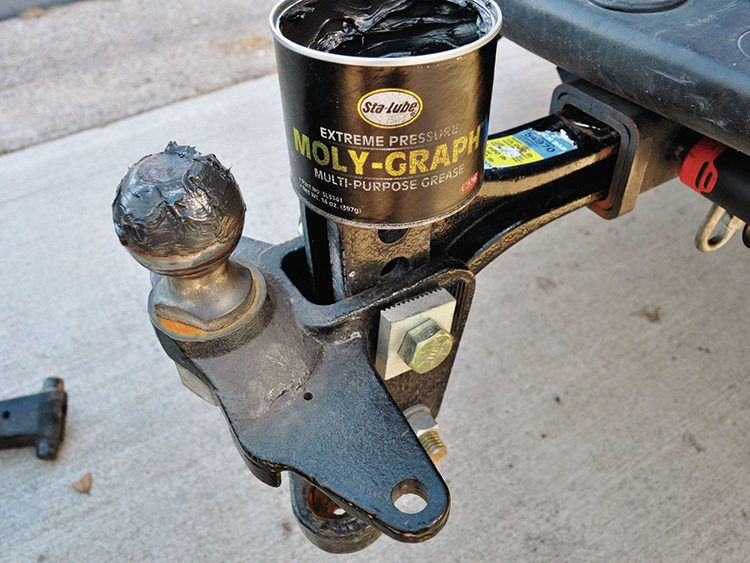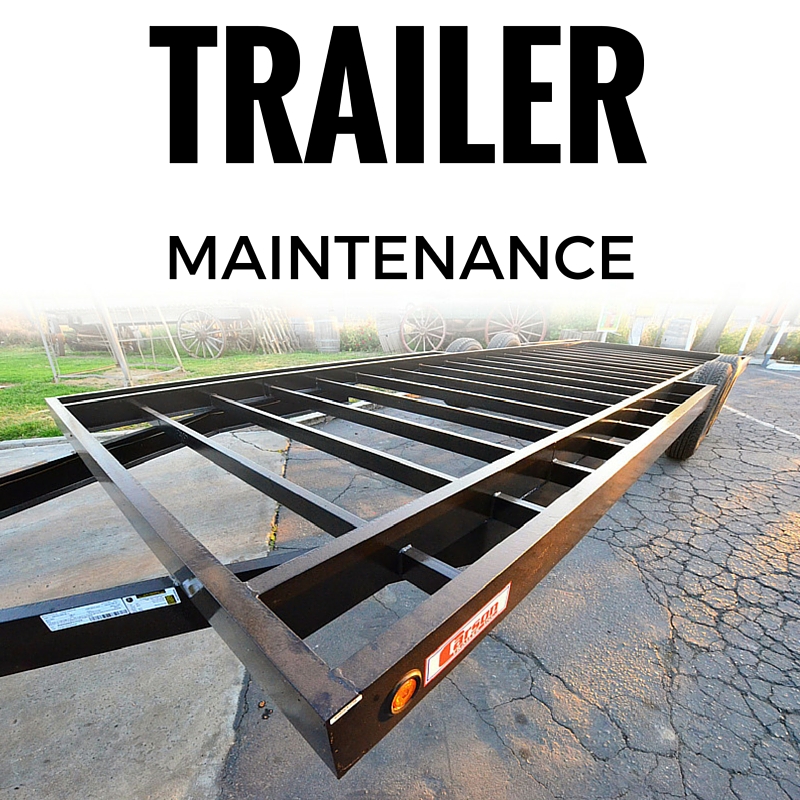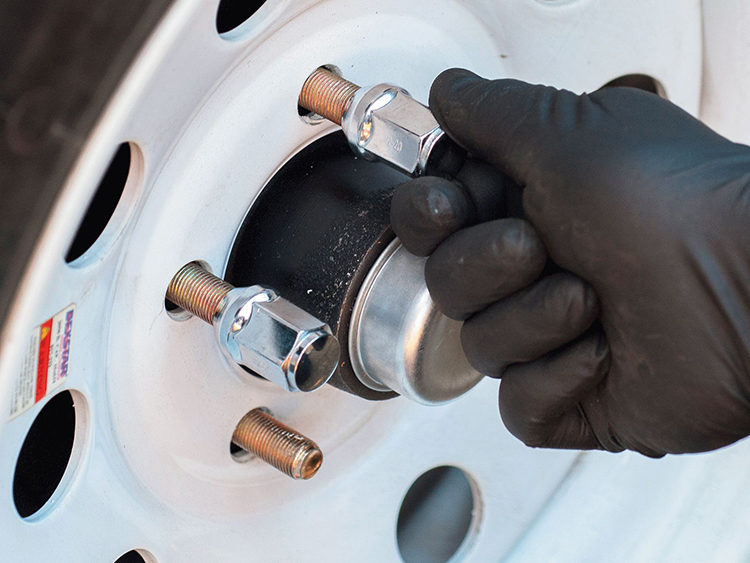When living in a tiny house on wheels it is very easy to overlook what should be the most carefully maintained part: the actual trailer. Despite the simple engineering of a couple of axles, some wheels, and maybe some brakes, the role of the trailer in the tiny house world is so crucial. These frames of steel are our foundations. They are the very things we rest our homes, our families, and our lives on. They allow us to sit still without motion and with comfort and also allow us to travel at whim. But how do we keep up with the maintenance? Perhaps these steps will help keep your trailer safe and lasting long-term.
Check tire pressure
Before each trip on the road you should be sure to check your tire pressure in all tires. You want to always inflate the trailer tires to the maximum inflation indicated on the sidewall. This number varies with each trailer so be sure to observe what your inflation psi is. You also want to check inflation when the tires are cool and have not been exposed to the sun or run down the highway. And while it may seem okay to underinflate, underinflation is actually the number one cause of tire failure. Tire pressure is essential to performance.
Check lighting
When your lights aren’t operating correctly you are at risk of being pulled over and getting a ticket, becoming a road hazard, and damaging your trailer. Before you hit the road make sure you have connected the plug from your trailer to your tow hitch. Verify that both turn signals and the brake signals are fully functional.
Check lug nuts
I am guilty of driving nearly 3,000 miles with a trailer attached that had the lug nuts on backwards. The threading was wrong and was causing the lugs to loosen with each turn of the wheel. The lug nut tension should be checked at least twice during the first 1,000 miles of trailer use to catch any loosening of the lug nuts if the lug studs “creep” slightly after being tightened for the first time. From then on you should check the lugs each time you have your oil changed (5,000 – 6,000 miles), your brakes serviced, or your tires rotated and/or balanced.
Check the bearings
Because most trailers used in the building of a tiny house have leaf spring axles repacking the bearings is a maintenance performance that must be made. To do so you remove the hub cap, remove the dust cap, use a pair of needle nose plie…..wait. Here is an excellent tutorial to help you. It is so important to trailer performance to have proper grease levels in the wheel hubs at all times. This keeps your tire from overheating, your breaks from wearing unnecessarily thin, etc. There is no time as to when to do this although some mechanics suggest every 12,000 miles or so. If your THOW has been parked for some time and you are preparing to move it you are definitely going to want to check the bearings for proper grease.
Grease your hitch
Before every 5-6 trips out I like to grease both the trailer ball and the hitch with standard automotive grease just so the natural movement of the trailer while in tow doesn’t cause an annoyance of loud sounds, a buildup of heat around the distribution area, lack of turn radius, or a host of other issues. It is a simple thing to do and can be done with just a great gun and a tube of $9 automotive grease or with just a can of multi-purpose grease and a latex glove. Think of taking butter to a skillet before you cook scrambled eggs. Same idea.
 It is truth. Trailer maintenance is not always convenient, it isn’t always fun, and it certainly isn’t always a clean endeavor. However, it offer up peace of mind as an operator and it keeps both you and others on the road as safe as possible. Take the time to run a systematic check and be a responsible trailer owner. Your tiny house will thank you.
It is truth. Trailer maintenance is not always convenient, it isn’t always fun, and it certainly isn’t always a clean endeavor. However, it offer up peace of mind as an operator and it keeps both you and others on the road as safe as possible. Take the time to run a systematic check and be a responsible trailer owner. Your tiny house will thank you.


Good info and great reminders. Trailer maintenance should be a part of house maintenance. You check your floors,roof,foundation,electrical,plumbing,
batteries for fire alarms etc. at lease twice a year. so, check your trailer. Get your spouse or partner involved and they too can become proficient at spotting little problems before it becomes a major issue. My wife has become so good at noticing any little change in our home and nine times out of ten SHE can fix it. BTW, how the heck does one put on lug nuts backwards?
The only answer I have is “carefully” Craig. One puts lug nuts on backwards very carefully. HAHAHAHAH!!!!!
Thank you. Especially for noting bearing maintenance. Here on the coast they are the first to go and the biggest headache to repair thereafter.
They can be a pain for sure Thomas. I especially find them to be painful when you have to do it away from home and have limited tools and resources. I mean, not that that has ever happened to me. * cough cough *
This article included some good pointers, however, I wanted to add to these points. Trailer axle nuts should be first tightened by hand to insure that cross threading has not occurred. Then lug nuts, according to their size, should be tightened with a torque wrench as per the listing attached. 1/2″ 100 ft-lbs, 9/16″ 140 ft-lbs, 5/8″ 175 ft-lbs. Trailers, whether American made or not, use components from China or Mexico. One of the first things to rust are the grease caps. OEM caps are made from mild steel and will begin rusting immediately. A good idea is to replace them with Buddy brand or equivalent caps with a bra. Yes, that’s no typo. Additionally, they’re made of stainless steel. When cleaning and re greasing the trailer bearings, take note to use GC-LB rated grease. G equals Automotive bearings, C equals Best, L equals Auto chassis, B equals best. Also, the rating needs to be # 2 (like peanut butter). Trailers built in the last few years already have UV protection included.
That’s a good tip to check tire pressure. You don’t pay attention to your trailer tires as often, since they’re behind you. My grandparents loved to take long trailer tips when I was younger.
It’s great that you pointed out checking the lighting on your trailer. I would imagine that is one of the easiest maintenance items to overlook. I think in general, you should have your trailer looked at at least once a year to prevent big problems.
Thank you for pointing out that a necessary thing to check on a trailer is to make sure that your tires are always appropriately inflated. My husband has been thinking of purchasing a trailer. It’s good to know the basics before he decides to buy one.
I like what you said about making sure that your trailer has properly greased wheel hubs. My sister wants to get a trailer so that she can travel across the country in the coming weeks. I’ll share this information with her so that she can look into her options for getting the right one to help with this.
That’s a good point that you would become a hazard to other drivers on the road if you don’t; have functioning lights on your trailer. I would think having no lights would be pretty dangerous, but I would have no idea how to fix that myself. I’ll have to make sure I get a pro to help me out with that if I decide to buy a trailer this year.